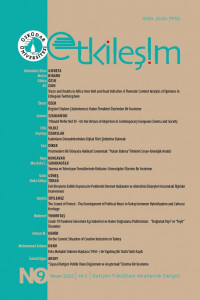Dijital Halkla İlişkilerde Yapay Zekâ: Bir Delphi Çalışması
Dijital Halkla İlişkiler, Yapay Zekâ, Delphi Tekniği
Artificial Intelligence in Digital Public Relations: A Delphi Study
___
- Agrawal, A. K., Gans, J. S., & Goldfarb, A. (2018, 14 April). Prediction, judgment and complexity: A theory of decision making and artificial intelligence [Conference presentation]. Rotman School of Management Working Paper. Toronto, University of Toronto.
- Alpaydın, E. (2016). Machine learning the new AI. The MIT Press.
- Bahar, M., & Somuncu, D. N. (2021). Delphi tekniği uygulama sürecine yönelik örnek bir çalışma: Çok fonksiyonlu tarım okuryazarlığı. Abant İzzet Baysal Üniversitesi Eğitim Fakültesi Dergisi, 21(1), 35-53. https://dx.doi.org/10.17240/aibuefd.2021.21.60703-814729
- Capterra, (2021, January 12). Public relations software. https://www.capterra.ca/directory/10033/publicrelations/software?overall_rating_ge=5
- Copeland, B. (2022, March 18). Artificial intelligence, encyclopedia Britannica. https://www.britannica.com/technology/artificial-intelligence
- Council of Europe. (n.d). History of Artificial Intelligence. Retrieved January 9, 2020, https://www.coe.int/en/web/artificial-intelligence/history-of-ai
- Dalkey, N. (1969). An experimental study of group opinion: The Delphi method. Futures, 1(5), 408-426. https://doi.org/10.1016/S0016-3287(69)80025-X
- Galloway, C., & Swiatek, L. (2018). Public relations and artificial intelligence: It’s not (just) about robots. Public Relations Review, 44(5), 734-740. https://doi.org/10.1016/j.pubrev.2018.10.008
- Gifford, J. (2010). Digital public relations: E-marketing’s big secret. Continuing Higher Education Review, 74, 62-72.
- Grunig, J. E., & Hunt, T. (1984). Managing public relations. Rinehart and Winston Inc.
- Herbert, E. G (2005). Digital public relations: A new strategy in corporate management. Nsukka Journal of the Humanities, 15, 135-143.
- Hsu, C., & Sandford, B. A. (2007). The Delphi technique: Making sense of consensus. Practical Assessment, Research, and Evaluation, 12(10), 1-8. https://doi.org/10.7275/pdz9-th90
- Jay, L., Davari, H., Singh, J., & Pandhare, V. (2018). Industrial artificial ıntelligence for industry 4.0-based manufacturing systems. Manufacturing Letters, 18, 20-23. https://doi.org/10.1016/j.mfglet.2018.09.002
- Kemp, S. (2023, January 26). Digital 2023: Global overview report. https://datareportal.com/reports/digital-2023-global-overview-report
- Kennedy, H. P. (2004), Enhancing Delphi research: Methods and results. Journal of Advanced Nursing, 45(5), 504-511.
- Liu, J., Chang, H., Forrest, Y. L., & Yang, B. (2020), Influence of artificial intelligence on technological innovation: Evidence from the panel data of China’s manufacturing sectors. Technological Forecasting & Social Change, 158, 120142. https://doi.org/10.1016/j.techfore.2020.120142
- Maldonado, M. (2020, 29 October). AI in PR: The conversation has just begun. https://instituteforpr.org/ai-in-pr-the-conversation-has-just-begun/
- Mason. (2019, January 3). How artificial intelligence helps reach target audiences. https://mason23.com/how-artificial-intelligence-helps-reach-target-audiences/
- Mccarthy, J. (1998). What is artificial intelligence?. http://jmc.stanford.edu/articles/whatisai/whatisai.pdf
- McLuhan, M. (1994). Understanding media the extensions of man. The MIT Press.
- Oracle. (2022, January 5). Yapay zekâ nedir? Yapay zekâ hakkında bilgi edinin. https://www.oracle.com/tr/artificial-intelligence/what-is-ai/
- Powell, C. (2003). The Delphi technique: Myths and realities. Journal of Advanced Nursing, 41(4), 376-382. https://doi.org/10.1046/j.1365-2648.2003.02537.x
- Wakefield, R., & Watson, T. (2014). A reappraisal of Delphi 2.0 for public relations. Public Relations Review, 40, 577-584.
- Yıldırım, A., & Simsek, H. (1999). Sosyal bilimlerde nitel araştırma yöntemleri. Seçkin Yayıncılık.
- ISSN: 2636-7955
- Yayın Aralığı: Yılda 2 Sayı
- Başlangıç: 2018
- Yayıncı: Üsküdar Üniversitesi
‘Vizontele’ Filmindeki Delilik Temsilleri Bağlamında Gülme ve Alay Etmenin Ötekileştirme Boyutu
Kültürel Coğrafya Perspektifinden Belgesel Filmlerde Ses Kuşağı Tasarımı
Kriz Anında 'Twitter'da Eşik Bekçiliği: Türkiye'de #Taksim Patlaması Olayının İncelenmesi
İkinci Dünya Savaşı Sonrasında Diaspora Ermenilerinin Anavatana Geri Dönüş Çağrısını Yeniden Okumak
Haberin Değeri/Değersizliği ve Etik İkilemler: Malatya Yerel Basını Üzerine Nitel Bir Araştırma
Cephaneliğini Genişleten Sömürgecilik: Büyük Veri Çağında “Bağlantının Bedelleri"
Geç Osmanlı Dönemi ve Erken Cumhuriyet Dönemi Arasında Yayımlanan Türkçe Gazetelerin Dil Analizi
